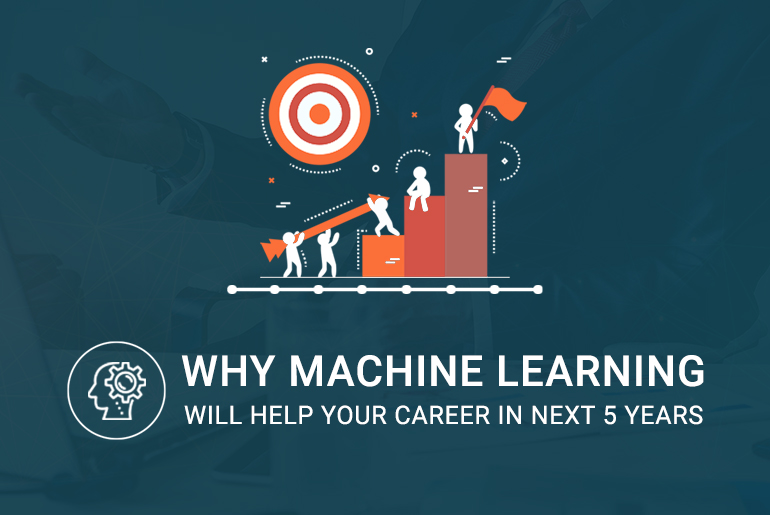In keeping with the current trends, where the world is rooting for AI systems, if you too are wondering if machine learning should be your next step, you are at the right place.
In next five years, AI will grow exponentially.
On one hand, this growth will trigger a phase of higher expectations and innovative solutions.
On the other hand, it will further deepen the gap between demand and availability of trained talent pool, in particular people who are deft at machine learning.
For those who are total newbies to Machine Learning, here’s a one para intro on what Machine Learning is.
ML is the process of making a machine learn and understand what to learn and what to not.
Let’s discuss why learning machine learning will help your career in next five years:
Reason 1: Every industry will be using it!
Almost every imaginable field has a use for machine learning and the use cases continue to grow day by day. Accredian Research team looked at some industries to help you understand these use cases.
Industry#1. Financial services:
The financial industry uses machine learning for two major jobs: to identify important insights in data, and to prevent fraud.
These insights help investors in identifying investment opportunities and in knowing when to trade.
Also, it helps the companies in segregating potential customers based on their behavior data.
Using the same behavior data, one can detect early signs of fraud.
Industry#2. Healthcare:
Due to advent of wearable devices and sensors, real-time data about a patient’s health is available and this can be used to assess the patient’s health in real-time.
Analyzing such accumulated data helps the medical experts to recognize such trends or red flags which may lead to improved diagnosis and treatment.
Example#3. Marketing and sales
That ‘you might also like’ tab on your shopping websites is machine learning at work.
ML algorithms analyze your shopping history and predict and promote items you might also like.
This gives us a personalized shopping experience and saves both time and money.
Example#4: Government
Government agencies have multiple sources of data which can be mined for insights.
For example, one can help detect fraud and minimize identity theft using machine learning on the Aadhar Card data (UIDAI scheme).
Example#5: Oil & Gas
ML helps in finding new energy sources, analyzing minerals in ground, predicting refinery sensor failure, calibrating oil distribution to make it more efficient and cost-effective.
The vast number of ML applications in this field is still expanding.
Example#6: Transportation
The transport industry relies on making routes more efficient and predicting potential problems and hence analyzing data to identify patterns and trends is the key to increase profitability.
ML’s capacity of data analysis and modeling is in particular important to public transportation, delivery companies etc.
The list of fields implementing ML is not limited to the ones mentioned above, these are just snippets.
All these applications indicate towards one trend that ML is soon to be the field on boom and a lot of research work will go in it.
Learning ML while it is on the rising part of the curve before plateauing to mature stage, would seem a great decision right about now.
Reason 2: Jobs will find you
Taking in consideration the exponential multiplication of processing power
every five years, IFTF experts have estimated that 85% of future jobs haven’t been invented yet.
These jobs will not be the regular run-of-the-mill lot. These jobs will make extensive use of AI and even more so, of ML.
As we discussed earlier in the article, the number of organization embracing AI and ML is going up by the second.
In such a competitive scenario, engineers who are adept in machine learning will be highly coveted.
During such time when a technology is experiencing a boom, number of experts is low and people who start their careers in the technology at this point become flagbearers of that technology.
The focus of ML is gradually shifting towards more complex real-life modelling and the number of parameters in each situation will go up in a spiral.
The talent-demand gap is steep and this in general, works in favor of the employee than the employer.
If you start polishing your ML skills today, in next five years, you will have a plethora of opportunities to choose from.
At Accredian, we believe that the best of Machine Learning and AI is yet to come!
Reason 3: Best time to be a start-up
For those of us who do not see a job or an employment as their ultimate goal, ML has a lot to offer.
With the advancement in computational power, the limit on what we can do with computers has relaxed.
As better hardware keeps coming up, we will have more flexibility. This higher flexibility will team up with the tools of today like R, Python, Java APIs, Julia etc will open up a whole new world of possibilities.
To stay in competitive in the changing times, a company needs to be agile. According to a research by Dell Tech, 78% of businesses feel threatened by digital startup and they are right to take that stand. For example, AirBnB started out in 2008 and today has more rooms than the Hilton chain, the Marriott and the International combine, in terms of room available online, not in terms of real estate.
Moreover, in the same study, almost 48% global businesses don’t know what their industry will look like in three more years. Around six in ten businesses are unable to meet the client’s top demands.
Fresh ideas and innovative solutions for persistent problems are bound to come up. Especially with the demand-supply gap between businesses and clients, somebody will have to fill up the gap.
If you have an idea that you believe you can sell, start working on it. Not like a weekend DIY project but pour all your ML skills into it and package the service so that it pops up.
Reason 4
‘Upskilling’ your career while the world is upskilling!
73% of these global companies believe that digital transformation could be even more widespread than it is now. (IFTF report)
This is a statement which needs no proofs. We all know it and we are watching it happen. What we are hinting at right now, is how it will affect your career.
When digital transformation becomes that prevalent, AI will be everywhere. Multiple algorithms and systems will function side by side. Preventing their interference with each other and helping them collaborate with each other will be a whole different task. Engineers will also need to write better algorithms to help intelligent systems interact with each other in unforeseen situations.
In 2011, Cornell Creative Machine Lab scientist tried to make two chatbots have a conversation with each other. It got pretty sassy and the conversation did not last for more than five minutes. These chatbots were advanced enough to have a successful conversation with humans but with another chatbot, misunderstood meaning led to a virtual standoffish conversation.
In future, we would need a more seamless approach and subsequently more seamless algorithms i.e. Algorithms scalable in real-life situations.
As an ML engineer, you will be writing these complex algorithms. You will need to constantly improve your logic and help the algorithm consistently perform well. In other words, your skills will be relevant for a long time and overtime, they will also be refined.
Reason 5
Being in is the only way out!
AI is expected to oust many professions like like telemarketers, proofreaders, computer support specialists, marketing and sales analysts etc. AI has been performing quite well in these jobs and that’s why these will be completely automated.
Similarly, as the machines get smarter, they will take up more jobs in the name of holy automation. However, we will still need humans to train, test, improve and maintain these machines. We will also need humans to manage humans working in these domains.
It’s very much like saying that if you wish to ensure that you have a job when the kingdom comes, you would be better off working the revolution.
So you and your HRM will sit pretty for a long while.
Reason 6: No Experience? No issues!
There is a huge gap in the number of ML engineers required and the number of engineers available. This has forced organizations to develop their own workforce from the scratch. In our experience at Accredian, we have seen that professionals who have good maths skills and decent coding knowledge of major programming languages like Python, R or Java, have a good chance of making it into the foyer. It’s a plus if your algorithm game is strong. The remuneration will be, however, lower in the beginning but once you’ve gotten hands-on experience of a project or two, it will only go up from there.
Reason 7: It’s not even that hard!
Machine learning is all about seeing a pattern, a web of correlations when there are none in the first sight. Then, lessons from this unstructured data are applied to unseen data and the system is expected to do so with minimum error.
Making the machine learn what it should and ensuring that the margin of error stays minimum is the job of an ML engineer.
You have a fair understanding of the job, you know what is the future of ML in the close future and what all benefits you are looking at if you ride this tide.
The most important factor of all, however, is your passion for learning ML. If you have an interest in this procedure, if all the possibilities that can be realized with the help of ML kindle your imagination and you are willing to put in the necessary hard work, then you have your work cut-out for you. Learning ML makes more sense if you are interested in the concept and either are a decent programmer or are working towards amping up your programming.
There are certain prerequisites in terms of skill for learning ML- you should be able to write a reasonably non-trivial program, be aware of linear algebra, probability theory, graph theory, calculus, statistics, graph theory and optimization methods.
The two most popular languages used for ML are R and Python, chosen depending on the end-function of the intended program/algorithm.
ML in itself is an iterative method, implementing the concepts mentioned above. It can be easily automated (given the iterative nature) and that too would be on you as to how you automate it.
It might seem like a lot of labor, moving from your current profile to that of a machine learning engineer. Considering the prospects and integrating them with your interest in the technology, will give you a good answer of where you should be. If you decide in favor of opting for machine learning, you’ll be pleasantly surprised that once you understand the concept, ML is actually very interesting.
Conclusion:
In this article, we discussed the current and upcoming trends in machine learning and how will they affect your career if you choose to shift your focus from your current job to machine learning. If you are not a software developer or someone from a coding background, you can still become a machine engineer. However, it will be harder than it is for people from development arena. You’ll have to start from the bottom, learning C/C++, Python/R and mathematics concepts like linear algebra, probability theory, statistics and analytical studies etc. It might be an uphill journey but ask any ML developer, the career prospects it opens up for you are worth it.
Over to you: Accredian Research Team would love to know which two reasons mentioned in this article did you relate to the most and why?






